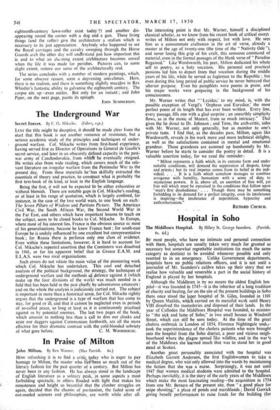The Underground War
Secret Forces. By F. 0. Miksche. (Faber,. r Ss.) LEST the title might be deceptive, it should be made clear from the start that this book is not another romance of resistance, but a serious academic study of the principles and techniques of under-
, ground warfare. Col. Miksche writes from first-hand experience, having served first as Director of Operations in General de Gaulle's secret service, and later in an obscurely defined capacity in the post- war army of Czechoslovakia, from whit* he eventually resigned. He writes also from wide reading, which covers much of the rele- vant literature on irregular warfare from the Peninsular War to the present day. From these materials he'has skilfully extracted the essentials of theory and practice, to consttuct what is probably the first text-book of its kind, at least in the English language.
Being the first, it will not be expected 16 be either exhaustive or without blemish. There are notable gaps in Col. Miksche's reading, or at least in his range of quotation, which is largely confined, for instance, in the case of the two world wars, to one book on each: The Seven Pillars of Wisdom and Partisan Picture. The American Civil War, the South African War, the Second World War in the Far East, and others which have important lessons to teach on the subject, seem to be closed books to Col. Miksche. In Europe, where most of his interest lies, France is the obvious source of most of his generalisations, because he knew France best ; for south-east Europe he is unduly influenced by one excellent but unrepresentative book ; for Russia there is perforce only one class of evidence. Even within these limitations, however, it is hard to account for Col. Miksche's repeated assertion that the Comintern was dissolved in 1941, or for his apparent belief that in Greece E.A.M. and E.L.A.S. were two rival organisations.
Such errors do not vitiate the main value of the pioneering work which Col. Miksche has undertaken. This cool and detached analysis of the political background, the strategy, the techniques of underground warfare and the methods of &fence against it (which make up the four divisions of the work) was much needed in a field that has been held in the past chiefly by adventurous amateurs ; and on the whole the analysis is judiciously carried out. The subject is important in more than a historical sense, for Col. Miksche rightly argues that the underground is a type of warfare that has come to stay, for good or ill, and that it cannot be neglected even in periods of so-called peace, so long at least as it is continuously practised against us by potential enemies. The last two pages of the book, which amount to nothing less than a call to don our cloaks and seize our daggers against Communism forthwith, are all the more effective for their dramatic contrast with the cold-blooded sobriety


































 Previous page
Previous page